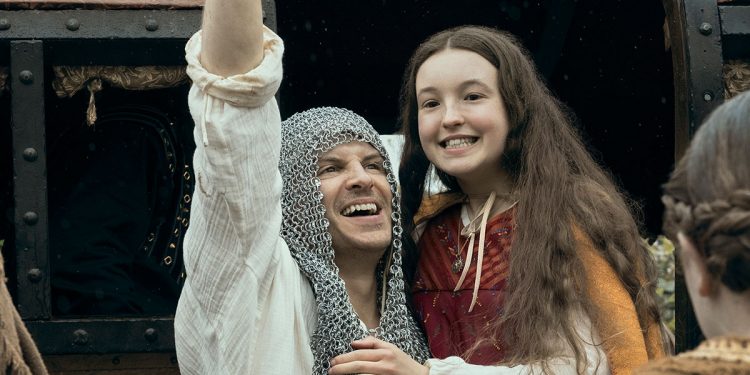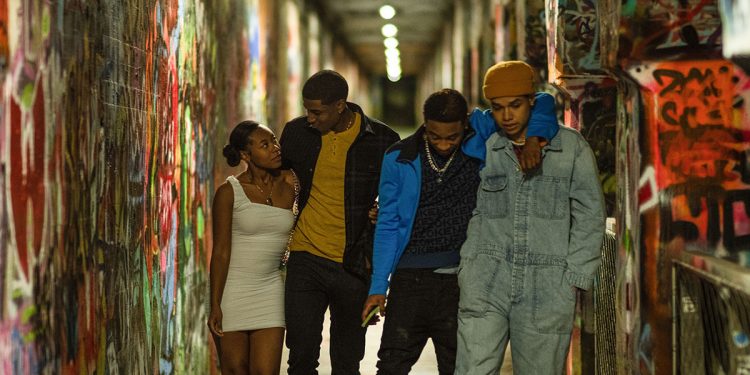It feels important that “Catherine Called Birdy” and “On the Come Up”, both films about girls coming of age in ambivalent circumstances, are directed by actresses turned directors. “Catherine Called Birdy” is director/writer/actress Lena Dunham’s third feature film. Since her debut film,
Dunham has been a polarising figure in contemporary media (something she seems to publicly relish). Even though her directing and writing has often eclipsed her work as a performer, Dunham’s image – even as sometimes actress – feels inextricably linked to her work. For Sanaa Lathan, who makes her feature debut with “On the Come Up”, her image as an actress feels even more central to how audiences know her. Lathan has been a central figure in contemporary Black film and television since the nineties, and like many key Black women of her age feels underserved and forgotten in recent years. Both Dunham and Lathan have performed versions of young womanhood on the camera, and there’s an urgency to the way that that awareness of what it means to a woman – or a girl on the brink of womanhood – that informs both of their films. They seem oppositional, but the two films feel importantly linked in the way they approach the maturity of a young girl as the most important thing in the world.

In “Catherine, Called Birdy”, her first film which she does not appear in as an actor, Dunham adapts Karen Cushman’s droll young adult novel of the same title in an equally droll, frothy yet sturdy account of a teen girl’s resistance to growing older. But Catherine (called Birdy) is not just any teen girl; she is a teen girl living in the 13th century whose arranged marriage is likely imperative once she becomes a woman, i.e., has her first period. This auspicious event happens early on and is the first of a series of complications that interrupt her carefree life.
Even as “Catherine, Called Birdy” retains Dunham’s feminist approach to humour, it feels like an outlier for a creator whose work has been so firmly placed in the adult sphere. Dunham’s work tends to confront questions of sexual identity, and sex, in overt ways. “Catherine, Called Birdy” is made with girls, and not women, in mind. It is also Dunham’s first major script that is not an original work, and with her own style refracted through the work of another, Dunham realises a skill for adaptation and an approach to comedic directing that takes her usual adult scenarios and recognises the gentleness of girlish skirmishes. “Catherine, Called Birdy” is light and lithe and is easily the most exuberantly fun thing she’s directed. This is no small feat, for even as the film hews close to its heroine’s youth, it is remarkably clear-eyed about the dynamics of what it means to live (and survive) for a woman in this era.
Read as a political entreaty, this may be all a bit too schematic in places but it’s a schematic quality that feels fitting with the film’s own perspective, which emanates from Birdy’s own myopic place of privilege – the daughter of a nobleman. In Bella Ramsey, Dunham finds a perfect avatar for this story. Dunham has always been an excellent director of actors, and she pulls a level of insouciance from Ramsey (best known as Lyanna Mormont on “Game of Thrones”) that feels like an important turn in her filmography. And her way with performers extends beyond this. The entire cast is note-perfect – Joe Alwyn as Birdy’s uncle, who she holds on a pedestal; Dean-Charles Chapman (another “Game of Thrones” alum, known for his work as Tommen Baratheon) loose and annoying but charming as her older brother; Billie Piper, brief but convincing as Birdy’s patient often pregnant mother. The ensemble here, which keeps growing with the introduction of more characters, never feels cumbersome. Even the briefest of characters are treated with generosity and an open warmth and two stand out – both because of Dunham’s attention but because of their own actorly cadences.
Sophie Okonedo pops up for three brief scenes in “Catherine, Called Birdy” – one of them an important scene of learning towards the end, and I’m still not certain whether it’s Dunham’s script, her direction, or the sheer power of Okonedo’s own skills that turn the sliver of a role into something so profound. It’s a reminder that Okonedo remains one of the most dependable contemporary performers. Even better, Dunham seems to save one of the film’s strongest arcs for Andrew Scott as Birdy’s beleaguered and exhausting father. It is a little (or a lot) odd that in this Feminist (in Training) Tale, that it is Scott’s ornery father that feels like the most fully realised character, perhaps even beyond Birdy. But it feels natural against Dunham’s own complicated history, and the legacy of her HBO series “Girls,” which served more as a launchpad for Adam Driver as an actor than any of the eponymous girls. Scott, though, is completely on Dunham’s wavelengths of ambiguous male figures. He is both exhausting and tedious but wonderful and lovable, sometimes in single scenes, adding a necessary complication to the film’s own earnestness. Just when the film’s own larkish romp seems too fatuous, Dunham jars us with an intense birth sequence or a daunting realisation of a seemingly unavoidable forced marriage (or two, or three). “Catherine Called Birdy” is not a historical examination of the 13th century, but it is a thoughtful and earnest foray into the life of a particular girl that feels rife with so much allegorical value for girls today. Watching it, I could only think of how few films today feel explicitly focused on the tale of a single girl as its focus. And how lucky that Lathan’s “On the Come Up” joins it with its own essential perspective.

Like Dunham’s film, “On the Come Up” is an adaptation of a young-adult novel, this one written by Angie Thomas, whose previous novel “The Hate U Give” was one of the better films of 2018. In the “On the Come Up”, Bri Jackson (Jamila C. Gray) hopes to carry on the legacy of her dead father by becoming a celebrated rapper. The path to success, though, is complicated by many things – her fraught relationship with her mother, a recovering addict struggling to make ends meet (played by Lathan); a mostly-white high-school that feels rife with issues of race; and the weight of her murdered father’s legacy on her shoulders.
And Lathan is explicit about building the shape of “On the Come Up” around Jamila C. Gray, who turns in the kind of performance that should be a breakout one, signalling many more to come. Gray, whose piercing eyes recall Lathan’s contemporaries Regina Hall and Nia Long, shines in close-up (the film frequently frames her face as the central thing in its story) where she must convince us of the possibility of being a potential virtuosic talent but also of the unpredictability of teenage girlhood. But, if “On the Come Up” is both slice-of-life-of-Black-America and teenaged-girl-semi-bildungsroman, scriptwriter Kay Oyegun (her feature-debut) carves out the space and the lives of this world with enough generosity that each stray moment, where a new character appears or another nuance is added, feels rich and vibrant. And it’s a vibrancy that Lathan, in her feature debut, meets.
It’s hard not to feel waves of nostalgia for a time-period when these kinds of Black films were the norms – when at any point something like “The Wood”, or “Crooklyn”, or “Love & Basketball”, or “Eve’s Bayou”, or “Boyz n the Hood” would emerge. Certainly, these films weave very different stories, but the energy of these films tell different stories but Lathan’s own history in that rich era of the 90s/early 00s feels part of the fabric of “On the Come Up”. Even though her work here lacks the kind of proficiency that establishes the coming-of-age paradigms in “Eve’s Bayou” or “Love & Basketball”, Lathan offers a tender perspective on Black girlhood. Like the prerequisite moment where Bri has her makeover-to-superstar moment in a new dress. The camera follows her down the elevator, but there’s nothing lurid or sensational about this transformation, only a gentle warmth that feels so important to the way that Lathan knows exactly who this girl is – as a teenager on the brink of maturity.
And it’s in those moments that emphasise Bri as child, not adult, that “On the Come Up” is best. There is the easy chemistry in the laughs (and squabbles) with her friends played excellently Miles Gutierrez-Riley and Michael Cooper Jr. There is also the childish resentment in her scenes with Lathan, as her beleaguered and guilty recovering-addict-mother. And then the awe and the doubt in her scenes with Method Man’s Supreme, the symbol of success and adulation in the rap game that Bri hopes for. Best of all are Bri’s scenes opposite an excellent Da’Vine Joy Randolph as her aunt, and sometimes manager. If “On the Come Up” feels slightly frenetic when put together, it’s a sign of Bri’s own inconstance – her doubts about family and her own ambition. The film mirrors that tentativeness, but also that earnestness, and in that mirroring is thrilling. The final sequence, ambitious in its sincerity, is the best of this. In “On the Come Up”, Bri’s very existence as a girl etching out a space for herself feels like the most important thing in the world. And it’s hard not to believe in that importance when the film is so sincere about it.
“Catherine Called Birdy” and “On the Come Up” are both available for streaming.





